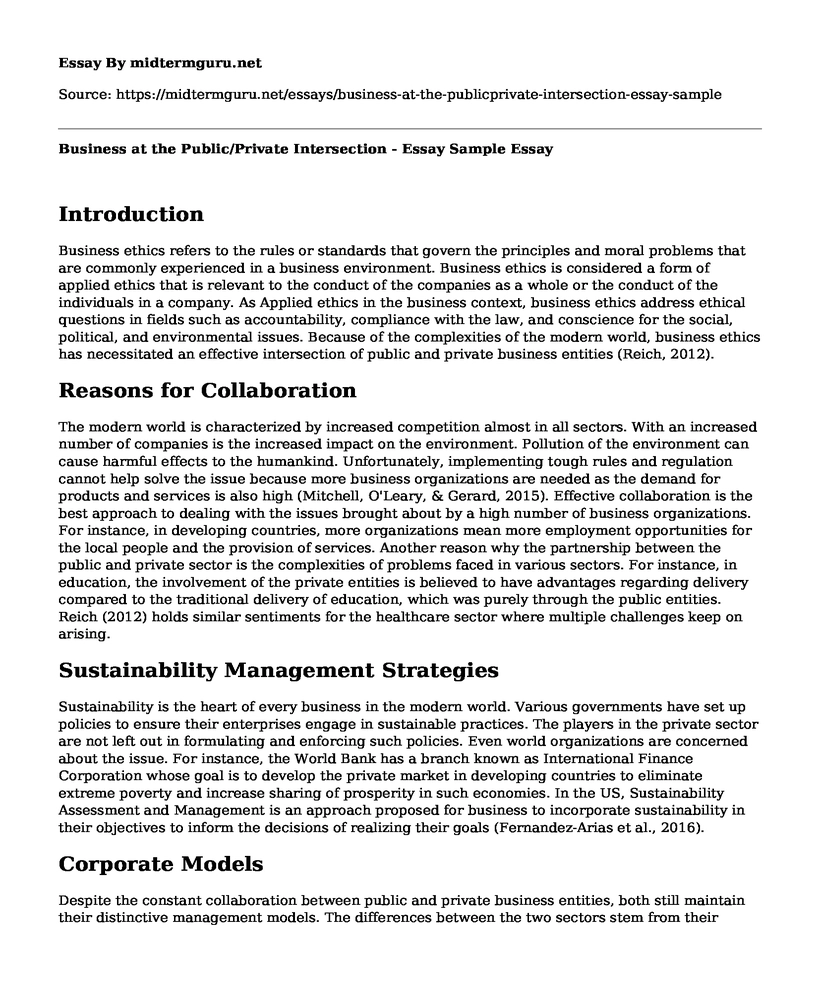Introduction
Business ethics refers to the rules or standards that govern the principles and moral problems that are commonly experienced in a business environment. Business ethics is considered a form of applied ethics that is relevant to the conduct of the companies as a whole or the conduct of the individuals in a company. As Applied ethics in the business context, business ethics address ethical questions in fields such as accountability, compliance with the law, and conscience for the social, political, and environmental issues. Because of the complexities of the modern world, business ethics has necessitated an effective intersection of public and private business entities (Reich, 2012).
Reasons for Collaboration
The modern world is characterized by increased competition almost in all sectors. With an increased number of companies is the increased impact on the environment. Pollution of the environment can cause harmful effects to the humankind. Unfortunately, implementing tough rules and regulation cannot help solve the issue because more business organizations are needed as the demand for products and services is also high (Mitchell, O'Leary, & Gerard, 2015). Effective collaboration is the best approach to dealing with the issues brought about by a high number of business organizations. For instance, in developing countries, more organizations mean more employment opportunities for the local people and the provision of services. Another reason why the partnership between the public and private sector is the complexities of problems faced in various sectors. For instance, in education, the involvement of the private entities is believed to have advantages regarding delivery compared to the traditional delivery of education, which was purely through the public entities. Reich (2012) holds similar sentiments for the healthcare sector where multiple challenges keep on arising.
Sustainability Management Strategies
Sustainability is the heart of every business in the modern world. Various governments have set up policies to ensure their enterprises engage in sustainable practices. The players in the private sector are not left out in formulating and enforcing such policies. Even world organizations are concerned about the issue. For instance, the World Bank has a branch known as International Finance Corporation whose goal is to develop the private market in developing countries to eliminate extreme poverty and increase sharing of prosperity in such economies. In the US, Sustainability Assessment and Management is an approach proposed for business to incorporate sustainability in their objectives to inform the decisions of realizing their goals (Fernandez-Arias et al., 2016).
Corporate Models
Despite the constant collaboration between public and private business entities, both still maintain their distinctive management models. The differences between the two sectors stem from their differences in value. Public interest, public needs, and political compromise are the core values of public management. The primary concern for a public manager is the overall wellbeing of society. On the other hand, managers in the private sector are only concerned about business revenues or wealth creation for the shareholders. As such, private sector managers are concerned about the survival and success of their businesses.
Conclusion
Public-Private Partnerships are now a common occurrence around the world as governments and private companies come together to solve the problems faced in their countries. While environment pollution is the main reason why such collaborations were initially formed, more and, more issues keep on arising from different sectors of the global economy including education and healthcare. Sustainability of businesses is also a concern that has brought the two parties together. Notably, despite collaborating, both public and private companies are still guided by different management models.
ReferencesFernandez-Arias, E., Sabel, C., Stein, E., & Trejos, A. (2016). Two to tango: public-private collaboration for productive development policies. Inter-American Development Bank. Retrieved from https://books.google.com/books?hl=en&lr=&id=0OZ3DwAAQBAJ&oi=fnd&pg=PR6&dq=reasons+for+public-private+collaborations+&ots=szahEqS5T_&sig=uSOVp9q5ikCpYPfCB3Os8WMUq2Y
Mitchell, G. E., O'Leary, R., & Gerard, C. (2015). Collaboration and performance: Perspectives from public managers and NGO leaders. Public Performance & Management Review, 38(4), 684-716.
Reich, M. R. (2012). Public-private partnerships for public health. Nature medicine, 6(6), 617. Retrieved from https://wcfia.harvard.edu/files/wcfia/files/697_partnerships.pdf
Cite this page
Business at the Public/Private Intersection - Essay Sample. (2022, Dec 21). Retrieved from https://midtermguru.com/essays/business-at-the-publicprivate-intersection-essay-sample
If you are the original author of this essay and no longer wish to have it published on the midtermguru.com website, please click below to request its removal:
- Volkswagens Issue a Convertible Bond - Paper Example
- Management Essay Sample: Shell Company Analysis
- History, Development, and Growth of the Toy-R-US Company Over Time - Paper Example
- The Nike Issue - Paper Example
- Technology Development and Globalization - Essay Sample
- UPS: Modern Tech Improving Supply Chain, Developing Business Synergy - Essay Sample
- Johnson & Johnson Crisis: Solutions and Implementation Plan - Essay Sample







